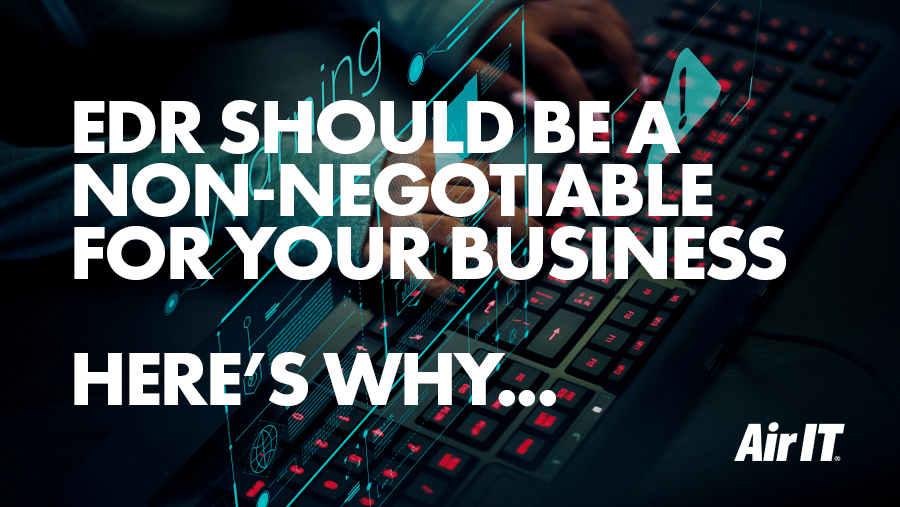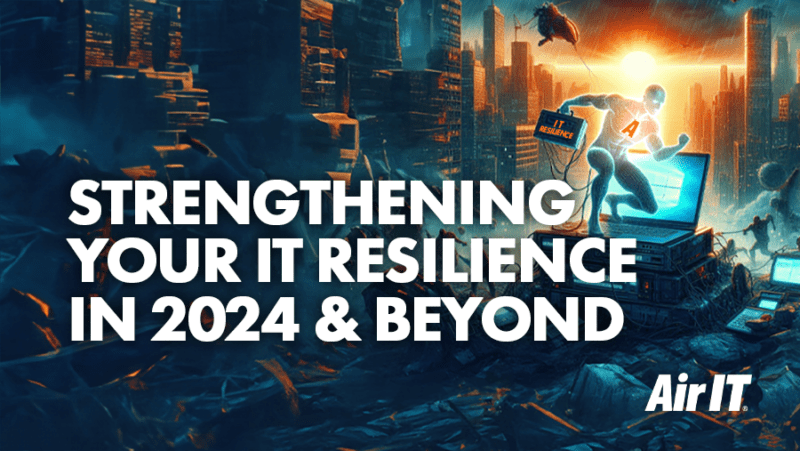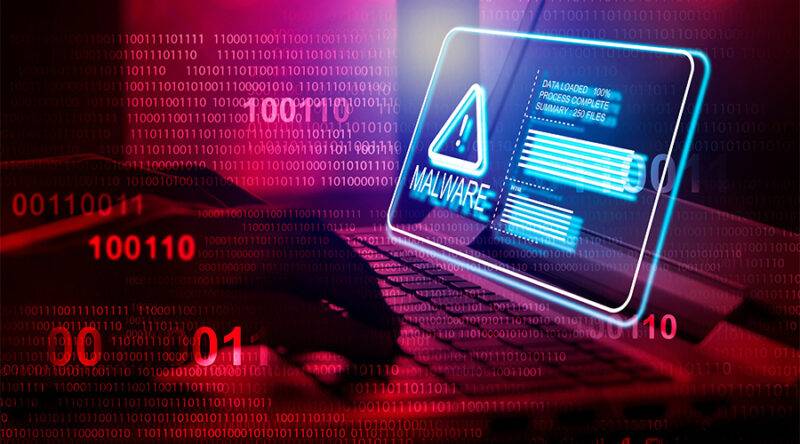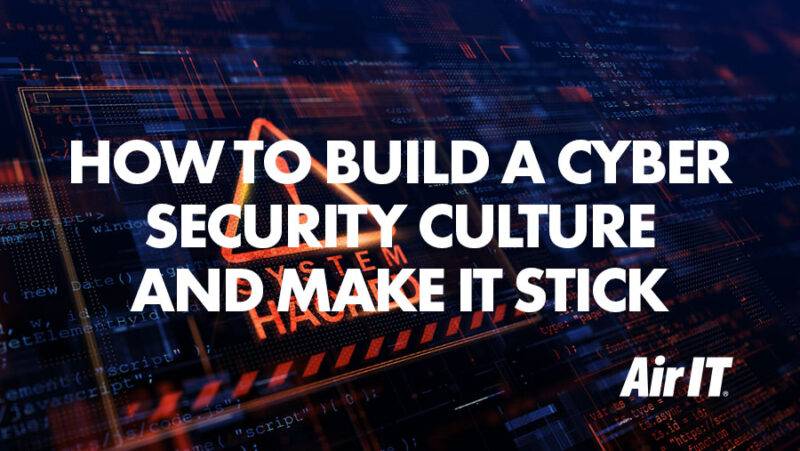With a spiralling number of cyber-attacks targeting businesses, cyber security isn’t just a choice; it’s a necessity. As cyber threats continue to advance, organisations need to strengthen their defences to protect valuable data, sensitive data, and the trust of their customers. One crucial element of a robust defence is EDR – here’s why it should be a key part of every business’s cyber security strategy.

What is EDR?
Endpoint Detection and Response (EDR) is a cutting-edge technology that monitors end-user devices, including laptops, tablets, mobile devices, Internet of Things (IoT) devices, and servers. It detects and responds to cyber threats like ransomware, malware, and other malicious activities.
EDR technology provides real-time visibility into endpoint behaviour. If any threats are detected and identified, the EDR technology promptly notifies a team of cyber security professionals, who then initiate remediation efforts.
Why EDR is essential for your cyber security
Your business’s cyber security strategy must prioritise EDR, and its implementation should be considered a top priority, here’s why:
- The threat landscape has changed significantly: The speed at which cyber threats are spreading is alarming. Cyber criminals are using more advanced tools and techniques to evolve their tactics, from sophisticated phishing attacks to ransomware, their strategies are always adapting to stay ahead of security measures, making it a constant challenge for businesses to protect themselves. According to statistics from DataProt, a staggering 560,000 new viruses are identified daily, adding to the over 1 billion viruses currently in existence. Businesses must remain proactive in staying ahead of the ever-evolving threats.
- Traditional anti-virus cannot keep up: Business owners and IT managers now face a daunting challenge in protecting their businesses and employees from potential threats in a modern business environment as traditional firewalls and antivirus software are no longer able to keep up with the pace of change or the sophisticated tools that cyber criminals are using.
- It could affect your cyber insurance cover: Many cyber insurance companies consider the lack of EDR technology as a significant risk. Therefore, they specifically ask businesses whether they have EDR technology or not, and in some cases, they may refuse to provide cyber insurance coverage to those who don’t have EDR technology.
Why do you need EDR?
An EDR solution is key to the success of any business. Endpoint security offers numerous benefits including:
- Detect sophisticated threats: Continuous network monitoring by EDR detects evolving cyber threats in real time to identify potential security breaches and anomalies.
- Rapid response to incidents: EDR facilitates quick responses to security incidents by promptly alerting and providing insights into the type of threats. It is crucial for modern workplaces as it helps to minimise the impact of a security breach and prevent further compromise of systems and data.
- Uncover hidden threats: EDR allows cyber security experts to proactively hunt for potential threats within a network. By analysing endpoint activities, EDR uses sophisticated automation and AI to uncover hidden threats, assess vulnerabilities, and address security weaknesses before they are exploited.
- Protection against data loss: Endpoints often store sensitive data. Whether it’s customer information, financial records, or intellectual property, securing this data is critical. Endpoint security ensures that data remains encrypted, and unauthorised access is prevented.
- Reduced downtime: A successful cyber-attack can disrupt operations, leading to downtime and financial losses. Endpoint security helps prevent such disruptions, ensuring business continuity.
- Secure remote work: With the rise of remote working, employees access corporate resources from various locations. Endpoint security extends protection beyond the office perimeter, securing devices wherever they connect to the network.
EDR vs MDR
Managed Detection and Response (MDR), also known as Managed EDR, extends beyond individual endpoints to cover the entire IT environment. It offers a comprehensive suite of threat response capabilities, including incident investigation, rapid response, and guidance for threat mitigation.
As an outsourced service, MDR efficiently maintains an additional line of defence at a fraction of the cost compared to running an in-house cybersecurity team. MDR involves a team of cybersecurity experts specialising in threat detection and incident response. These experts stay updated of the latest threats, attack techniques, and security best practices. By leveraging MDR, organisations gain access to a dedicated security team for 24/7 monitoring and swift response to potential threats.
Both MDR and EDR play critical roles in enhancing an organisation’s security posture with cutting-edge solutions. While both improve visibility and security integration, they are very different. EDR serves as a targeted tool deployed to safeguard specific endpoints, whereas MDR provides comprehensive security monitoring and management across an organisation’s entire IT environment, whilst providing a solution to the skills shortage that many organisations face.
Many organisations benefit from implementing both EDR and MDR solutions to effectively address security challenges.
Guy Liu, Head of Cyber Security at Air IT says:
Cyber threats are relentless, especially in today’s digital era where the stakes are higher than ever. In a world where compromise isn’t an option, EDR is crucial; acting on the frontline, anticipating, detecting, and neutralising threats before they cause damage. It’s more than just an investment; it’s your insurance in the ever-evolving landscape of cyber threats.
Strengthen your IT resilience through EDR
In an era where cyber threats are widespread, EDR is not merely an option; it’s non-negotiable. Organisations must prioritise EDR implementation to protect their critical assets, maintain business continuity, and protect customer trust.
Remember: Prevention is essential, but detection and rapid response are equally as important. EDR ensures you’re never caught off guard.
Discover more strategies to improve your IT and cyber security in our blog post titled ‘Strengthening Your IT Resilience in 2024 & Beyond’ Alternatively, feel free to contact us for further assistance in enhancing your security posture through cyber resilience.





